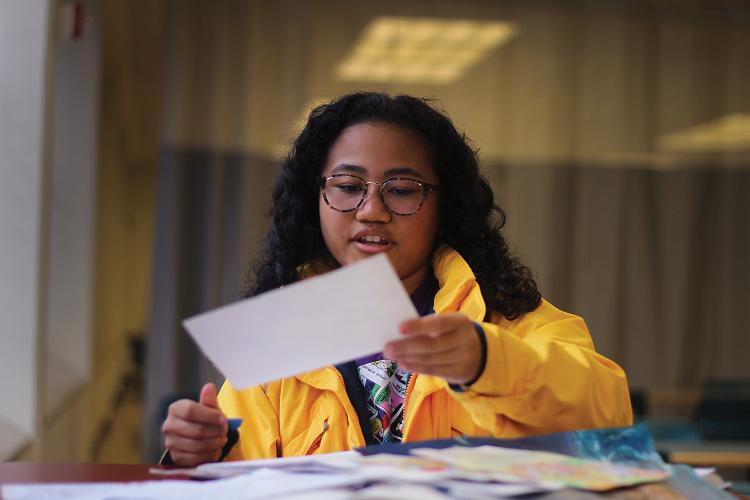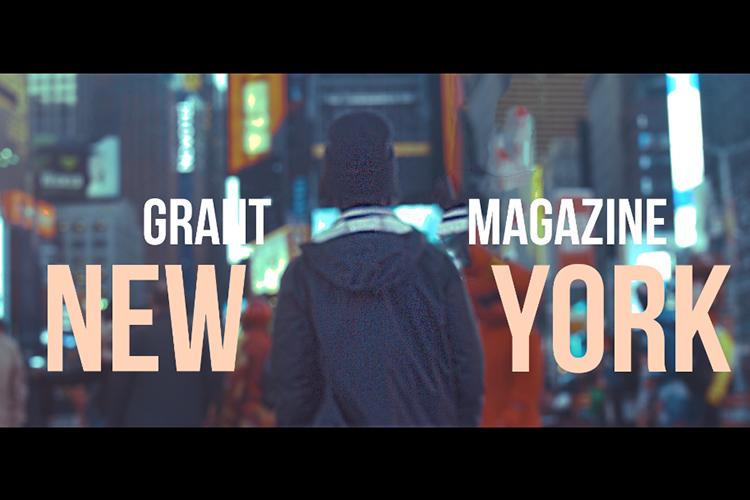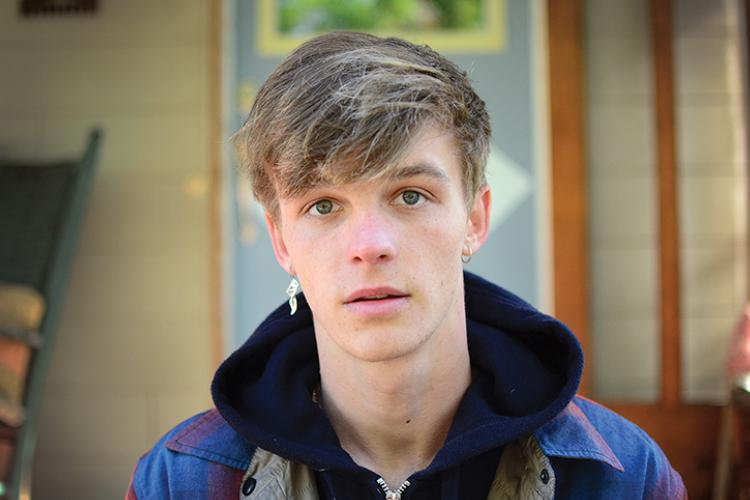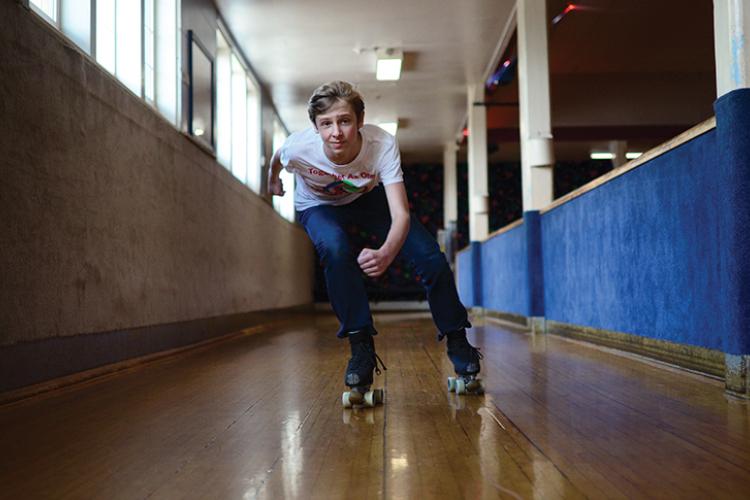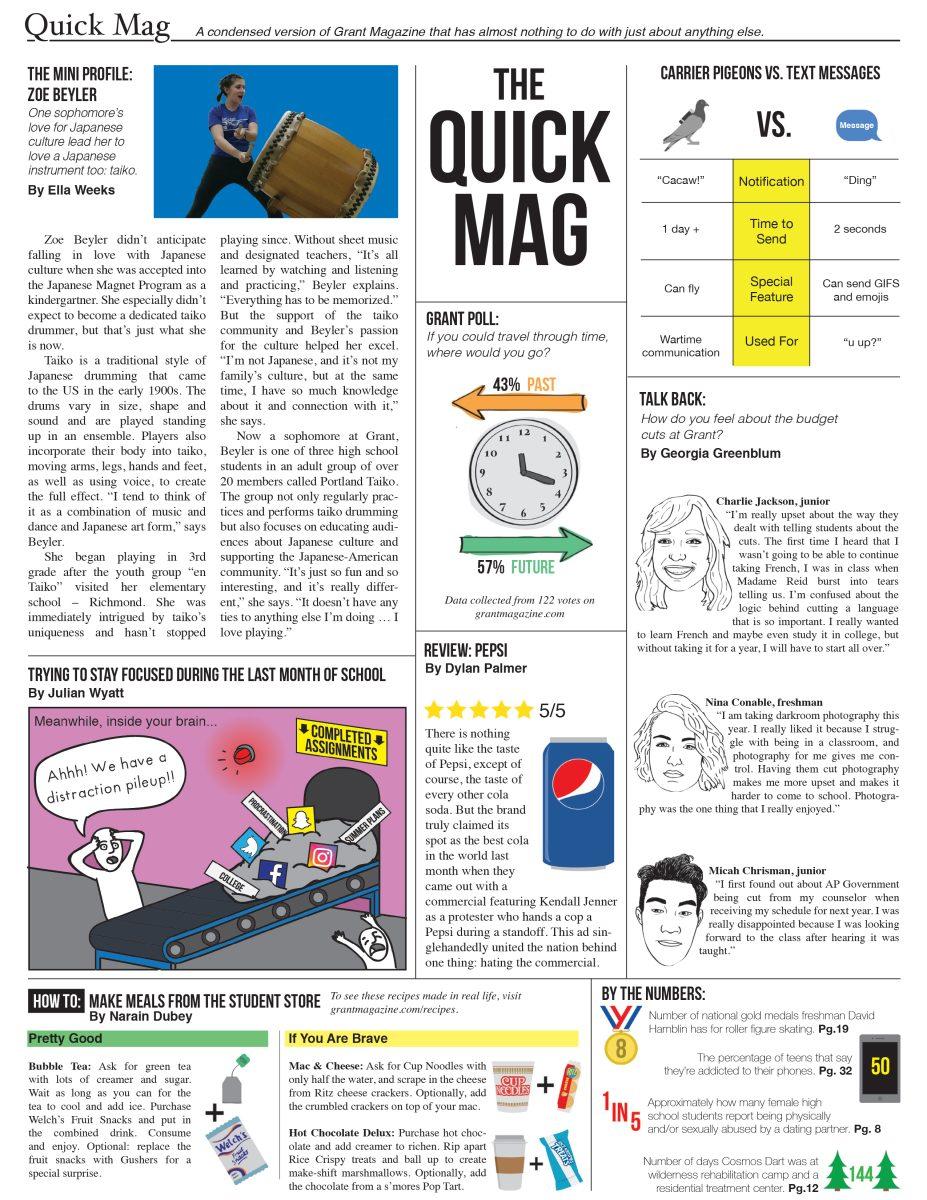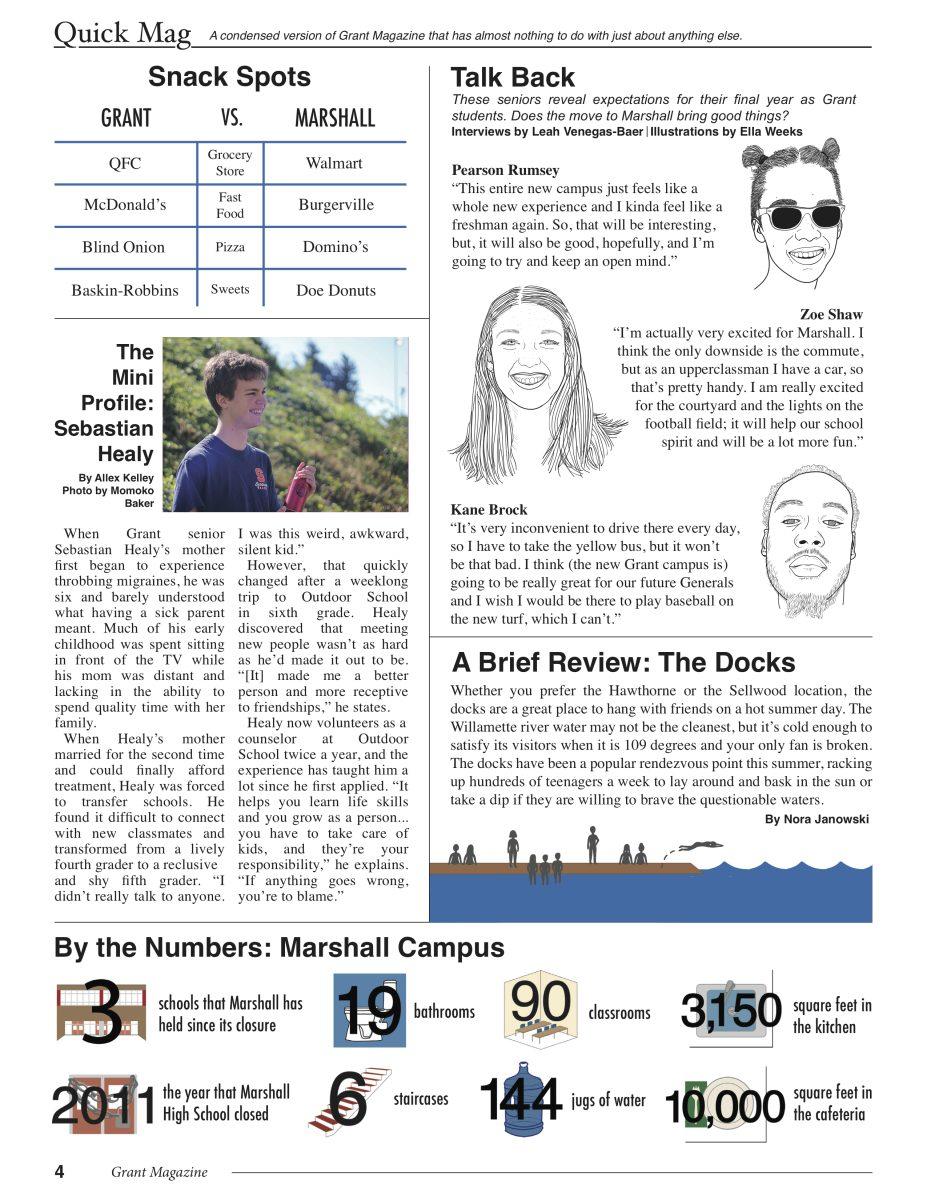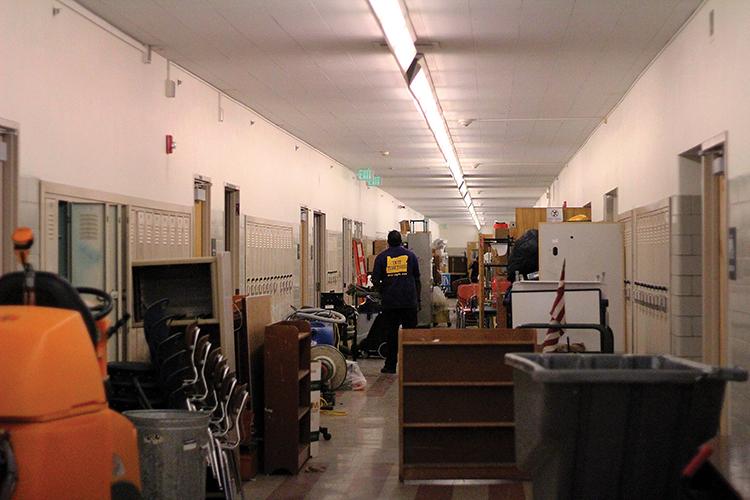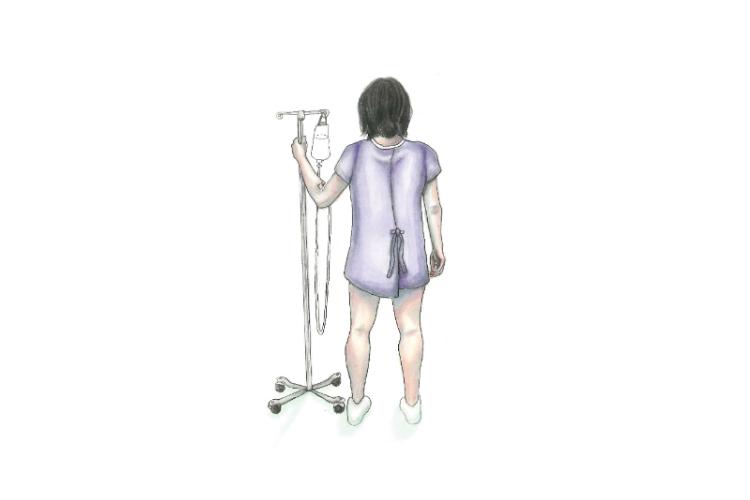
Stepping up to the microphone, then freshman Pan Aalto stares out into the crowd of cheering students. The auditorium goes quiet as he starts to sing, interrupted by a few shouts of encouragement. Soon the room is filled with the sound of Aalto’s voice accompanied by an electric guitar. A little over a minute into Christina Aguilera’s “Beautiful” the auditorium brightens with the light of students waving their phone flashlights above their heads as they sing the chorus along with Aalto.
After the last note disappears from the air, Aalto walks off the stage to thunderous applause. As he left the auditorium after the 2017 Rose Festival assembly, Aalto was approached by students and staff alike, complimenting his performance. “I felt like I was speaking out for the minorities and people who really need to be told that they are important, that they are beautiful, and it does matter that they’re here and it does matter what they say.”
For Aalto, music is a coping mechanism. He went to music to help him overcome grief after the death of a close friend and as he began to face an internal struggle with his gender and sexual identities. Starting in seventh grade he began to question both; Aalto was frustrated with himself because he couldn’t figure out how he identified.
“At that point of time I needed to rely on something that I loved a lot, which would be music,” he says. “It wasn’t a person that I could rely on because I knew that was too much to put on one person. I needed to put it into something that I was so passionate about, that I could just do it for hours.”
Now finding himself in a supportive community at Grant, Aalto has begun to share his story with others. He wants people to hear his experiences and know that it’s okay to be themselves.
“I think that it’s important that people have someone in their lives that’s similar to them and someone who makes them happy, and makes them feel loved and wanted.”
Born on July 9, 2002, Aalto’s early childhood was filled with family. While growing up, his cousin and uncle lived with him and his parents, and they spent a lot of time playing together. He remembers going to his grandparents’ church for a craft sale every Christmas.
“I had everything I needed at that point in time … in transgender stereotypes that I’ve seen a lot, there are lots of people that knew that they were trans when they were three or showed ‘signs’ of it. But I never showed those kinds of signs, I was who I was and I was happy being that person,” Aalto says.
Aalto credits his happiness as a young child to his parents allowing him to be whoever he wanted to be. “For me I was a girl until I wasn’t. I loved being a girl, I loved wearing whatever I wanted to wear, I loved to play with whatever I wanted to play with,” he remembers.
Aalto was exposed to a variety of music by his parents at a very young age, including John Coltrane and The Beatles. Aalto’s father, Mark Aalto says, “There’s normally music going on in our house most of the time. I grew up playing gigs around town.” Aalto remembers his father, who is a musician, trying to teach him to play the drums and the family listening to music together.
Donna Aalto, Aalto’s grandmother, recalls Aalto being able to sing from a very young age. “Pan could carry a tune before he was one year old. I love the authenticity of his soul,” she says.
The family’s love of music fostered a passion for singing in Aalto. Starting in second grade, he did choir with his elementary school. Aalto remembers singing the same songs every year and yet the repetition didn’t bother him; he looked forward to singing those songs again and again.
Aalto remembers sitting in the auditorium at Beverly Cleary during elementary school and watching the Royal Blues – Grant’s well known competition choir – perform. He looked forward to seeing the Royal Blues every year. Aalto longed to be on the stage singing with them.
Despite Aalto’s love for singing, he was shy, and it was difficult for him to share his singing with other people. “I’ve always been a really talkative kid and really social but when it comes to singing that’s kind of my secret identity,” Aalto says.
“Having music when I was in seventh grade when all of this was going on was one of the biggest blessings that I could ask for. It was that kind of thing that I could turn to when I needed support.” – Pan Aalto
Aalto’s first solo was in third grade. He got a part in “Portland: The Musical” which was directed by his elementary school choir director. Aalto remembers being surprised but excited to be cast as a rose queen. But as he stood on the stage, wearing a white dress with red roses and looking out into the audience on the night of the performance, Aalto’s nerves began to catch up to him. Suddenly he wanted nothing more than to run off of the stage and away from the crowd of people watching the show.
But singing in elementary school motivated Aalto to continue with choir. He began learning more challenging music and found a very supportive group of people. Choir always gave Aalto something to look forward to in the mornings before school.
His choir group even visited Grant to sing for the Royal Blues. He remembers getting critiques from John Eisemann, the Grant choir director, and deciding that his dream was to improve his singing in choir at Grant.
“That moment when you’re in a crowd and you hear a piece of music that moves you so that you feel like you’re in it is always what I’ve felt from the Royal Blues and Acapella,” Aalto says. “So being able to see (Eisemann) telling us how we can improve, I knew right then that I was definitely going to Grant and I was definitely doing the choir.”
When Aalto was in sixth grade a new student arrived at Beverly Cleary named José Tomás Oviedo Orozco. Orozco was from Colombia and was living in Portland with his aunt.
On Orozco’s first day at Beverly Cleary, Aalto approached Orozco and asked if he wanted to be friends. “I was like, he’s from a different country, that means that maybe he needs someone to be there for him,” Aalto says.
Orozco said yes and as the months went by they got increasingly close.
Aalto remembers how funny Orozco was and how he liked to tease his friends. They regularly played frisbee outside and once they went rollerskating together.
On Aalto’s thirteenth birthday, Orozco gave him a bracelet that Aalto still wears in memory of his friend.
After six months had passed, Orozco went back to Colombia. They continued to stay in touch via Skype, but as time went on communication started to diminish between the two.
Then, in March 2014, Aalto got word of a car accident that took Orozco’s life. He was in seventh grade at the time. As the year went on, Aalto’s family lost Aalto’s great-grandmother and his maternal grandmother was diagnosed with lung cancer. “I became, in those next few months, accustomed to that look my parents had given me that someone else had passed away,” Aalto says. “So from that first look on, I knew exactly when something was wrong.”
Orozco’s death held a lasting effect on Aalto. At first, because they were in different parts of the world, it felt like there was no way of knowing if he had really died. But when Aalto’s counselor at school showed him pictures of the crash it became real.
With Orozco’s death and the loss of other family members, Aalto began questioning everything in his life. “I hear that he’s dead and I can’t do anything but rely on news that was made across the world,” Aalto remembers. “So it made me kind of question everything and every aspect of what was real and what was not real.”
The questions surrounding the death of his friend lead Aalto to look inward and re-evaluate who he was. He struggled to understand why everything seemed to be happening at once. Because he was losing people who had helped him create his world, he didn’t understand who he was without them.
At the time Aalto identified as female, but tried to act more masculine. “I was always doing sports and trying to show people that I was really masculine and I never really understood why I was trying to do that,” he says.
Aalto’s close friend from elementary and middle school, Maddy Fleck-Hannan – now a sophomore at Saint Mary’s Academy – recalls that Aalto was never very “girly.” Looking back on the time before he transitioned she now recognized small changes that she didn’t notice at the time.
“I think the biggest thing was that his clothing was starting to change and his outlook towards girly things was starting to change. He was wearing pants and more boyish stuff,” Fleck-Hannan remembers.
While Aalto was struggling with his identity, music allowed him to escape from what was going on around him. It also gave him a place to be himself.
“Having music when I was in seventh grade when all of this was going on was one of the biggest blessings that I could ask for,” Aalto says. “It was that kind of thing that I could turn to when I needed support. I would listen to sad music and it would help me just relax and get everything out of my mind and kind of just let me be someone that I was supposed to be. Because I couldn’t figure out who that was and that was the biggest problem.”
Aalto began trying out labels, including lesbian, bisexual, pansexual and genderqueer, following a friend who was experimenting with their own sexuality and gender identity. “I felt like a label would be a little bit easier than just being who I was. I went between a lot of things. I knew that I wasn’t just this one person, I knew that I wasn’t just this girl in seventh grade, who was straight,” he says.
Throughout this process, Aalto was very open with his parents. By the end of his seventh grade year, Aalto knew he was transgender, but his transition continued to be a long and painful process. “I knew that I was a person but I couldn’t figure out who that was. It took me a long time. In fact in eighth grade I still had long hair and I didn’t go by he/him pronouns,” Aalto recalls.
Mark Aalto recognizes that it was a very difficult time for Pan. “Pan tends to be pretty logical, so I think the harder part was that this was something that is very emotional,” he says. “Pan was having to try to work his way through feelings.”
One of the hardest things for Aalto to deal with while transitioning was hiding who he was from his extended family. He remembers feeling relieved when he finally came out. “I started crying, I was like, ‘Wow this is actually happening,’” Aalto says.
He remembers his uncle’s response to the news of his transition. “He used to call me ‘niece’… And the day that I came out he goes, ‘I love you so much nephew Pan.’”
At that point Aalto knew that, although his transition had been long and painful, things were going to be better from then on. “(Transitioning) was great because it gave me time to figure out who I was,” Aalto says. “That time really helped me figure out that everything was going to be okay, I just needed to figure everything out and it would be okay.”
The first days of his freshman year at Grant were incredibly stressful. “I was really scared in the beginning of the year because I was in a whole new setting,” he says. “I was really nervous that I wasn’t going to pass … lots of people had to ask me about my pronouns.”
Aalto quickly found his niche in Men’s Ensemble. He was instantly accepted into the group and never felt like he wasn’t supposed to be there. “I’ve actually found that Men’s Ensemble is one of the most accepting groups of people that I have ever met, and I love to be with them, I love singing with them.”
Men’s Ensemble gave Aalto a whole new perspective on music and singing. He learned how to take the music he hears, write it down and calculate the beats.
Through choir at Grant, Aalto has received several opportunities to share his talent and passion for singing. The first was at Grantasia in January of 2017 where Aalto had a solo with Rami Holmes, another freshman. It is rare for a freshman to be awarded a solo in Grantasia.
“I was really insecure, I was thinking about what my hair looks like, what my button up and pants looked like … I was just nervous that I wasn’t getting the pitch right. I was freaking out about ‘Oh my god I’m in front of a ton of people and we’re singing a Christmas song in the middle of January,’” he remembers.
As a part of the LGBTQ+ community Aalto felt it was important for him to participate in the Speak Out Assembly when asked by a friend. Given only a day to prepare, he wrote a piece about his experience as a gay and transgender person. He was nervous that what he had prepared wasn’t right, as he hadn’t seen anyone else’s piece. However, in the end, Aalto was glad he participated. “I would love to be the kind of person that people can look up to, and be like, oh I want to be like that person, and hopefully do really good things with my life,” he says.
Aalto hopes that he can be a role model to people like him, because he didn’t have anyone to look up to or relate to when he was beginning to question his gender or when he started to transition.
Aalto’s first year at Grant gave him almost schoolwide recognition and an opportunity to grow and improve his singing. Mark Aalto was impressed with how supportive and welcoming the Grant community was, and says it has helped Aalto to grow. “It seems like Pan has really blossomed … he’s really gotten a chance to develop the talent,” he says.
Aalto hopes to become more of a leader in the LGBTQ+ community at Grant by sharing his experiences. He would like to be a person that people can come to to talk about their struggles, so that he can be there for them, and no one has to feel alone like he did while going through loss and struggling with his identity.

“I want to be there for others and help them get through what I was going through. Having that person, and having that positive outlook, saying ‘You know you’re going to be okay, we’re going to get through this. Even if it’s not going to be okay then you have my shoulder, I’m going to be here for you.’ That’s what I needed at that point in time, and I want to be there for people who need that now.”
Recently Aalto posted an original song to his YouTube channel, titled “Bounty Hunter.” Aalto was inspired to write it after hearing about President Trump’s proposed ban on transgender people in the military. In the beginning of the video Aalto explains his experience of looking for someone like him in the media, and how he wasn’t able to find that role model.
“I remember in my transitioning period of time, when I was younger, in the start of my transition, I was really looking for someone to look up to, preferably someone who was pre-T, because I was as well, and right now I still am pre-T, pre-everything. So I was really looking for someone who was similar to me who liked singing and music. But I didn’t find anyone, and even though I had friends I still felt really lonely and didn’t feel represented. So I’m hoping that I can be that person for someone in the future or in the present or anytime,” Aalto says in the video.
Both friends and family can tell that Aalto is more sure of himself now than he was before. Fleck-Hannan says, “He is definitely a lot happier and more comfortable in his own body I think. He’s always been happy, but I can definitely tell he is a lot more comfortable with himself.”
For Aalto, the journey to find himself isn’t over but through music he has found a place where he can be happy and be himself.
“It was difficult to try to find my truth, which I still don’t think that I’ve found and I don’t think I’m going to be rushing that anytime soon. But I think that it’s important that people have someone in their lives that’s similar to them and someone who makes them happy, and makes them feel loved and wanted.”



























